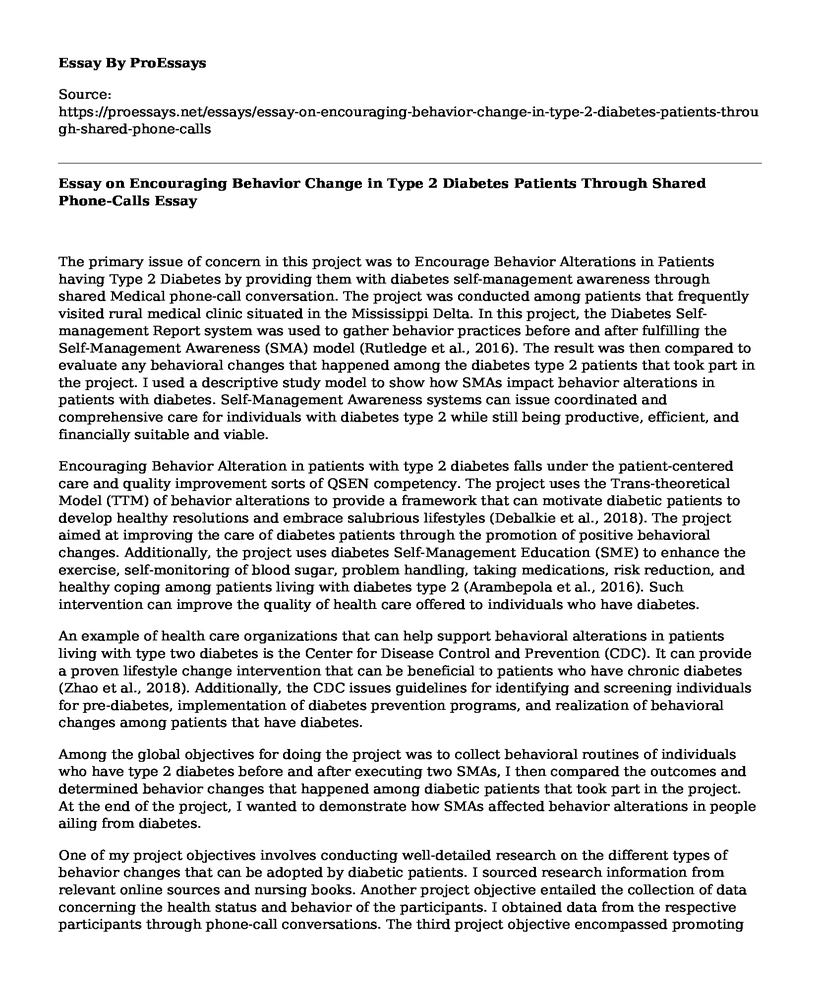The primary issue of concern in this project was to Encourage Behavior Alterations in Patients having Type 2 Diabetes by providing them with diabetes self-management awareness through shared Medical phone-call conversation. The project was conducted among patients that frequently visited rural medical clinic situated in the Mississippi Delta. In this project, the Diabetes Self-management Report system was used to gather behavior practices before and after fulfilling the Self-Management Awareness (SMA) model (Rutledge et al., 2016). The result was then compared to evaluate any behavioral changes that happened among the diabetes type 2 patients that took part in the project. I used a descriptive study model to show how SMAs impact behavior alterations in patients with diabetes. Self-Management Awareness systems can issue coordinated and comprehensive care for individuals with diabetes type 2 while still being productive, efficient, and financially suitable and viable.
Encouraging Behavior Alteration in patients with type 2 diabetes falls under the patient-centered care and quality improvement sorts of QSEN competency. The project uses the Trans-theoretical Model (TTM) of behavior alterations to provide a framework that can motivate diabetic patients to develop healthy resolutions and embrace salubrious lifestyles (Debalkie et al., 2018). The project aimed at improving the care of diabetes patients through the promotion of positive behavioral changes. Additionally, the project uses diabetes Self-Management Education (SME) to enhance the exercise, self-monitoring of blood sugar, problem handling, taking medications, risk reduction, and healthy coping among patients living with diabetes type 2 (Arambepola et al., 2016). Such intervention can improve the quality of health care offered to individuals who have diabetes.
An example of health care organizations that can help support behavioral alterations in patients living with type two diabetes is the Center for Disease Control and Prevention (CDC). It can provide a proven lifestyle change intervention that can be beneficial to patients who have chronic diabetes (Zhao et al., 2018). Additionally, the CDC issues guidelines for identifying and screening individuals for pre-diabetes, implementation of diabetes prevention programs, and realization of behavioral changes among patients that have diabetes.
Among the global objectives for doing the project was to collect behavioral routines of individuals who have type 2 diabetes before and after executing two SMAs, I then compared the outcomes and determined behavior changes that happened among diabetic patients that took part in the project. At the end of the project, I wanted to demonstrate how SMAs affected behavior alterations in people ailing from diabetes.
One of my project objectives involves conducting well-detailed research on the different types of behavior changes that can be adopted by diabetic patients. I sourced research information from relevant online sources and nursing books. Another project objective entailed the collection of data concerning the health status and behavior of the participants. I obtained data from the respective participants through phone-call conversations. The third project objective encompassed promoting healthy exercise, eating, and a healthy lifestyle among patients with type 2 diabetes. Ultimately, I aimed at implementing two SMAs and evaluating the results obtained.
Conclusion
To effectively achieve the project goals, I developed several resources. I first reviewed the guidelines for the implementation of behavior changes among type 2 diabetes on the CDC website. I then created a project schedule which enables me to accomplish the project duties within the stipulated time. Additionally, I developed Self-Management Awareness systems that helped me assess the behavior routines of patients before and after the project (Kueh et al., 2017). Ultimately, I established a check-list that assisted me in monitoring the behavior changes of such patients.
References
Arambepola, C., Ricci-Cabello, I., Manikavasagam, P., Roberts, N., French, D. P., & Farmer, A. (2016). The impact of brief automated messages promoting lifestyle changes delivered via mobile devices to people with type 2 diabetes: a systematic literature review and meta-analysis of controlled trials. Journal of medical Internet research, 18(4), e86.
Debalkie, G., Alemu, K., Abamecha, F., & Fentahun, N. (2018). Predictors of regular physical activity among Type 2 diabetes mellitus patients in Wolaita Sodo University teaching hospital using the Trans-Theoretical Model. Ethiopian Journal of Health Development, 32(2).
Kueh, Y. C., Morris, T., & Ismail, A. A. S. (2017). The effect of diabetes knowledge and attitudes on self-management and quality of life among people with type 2 diabetes. Psychology, health & medicine, 22(2), 138-144.
Rutledge, S. A., Masalovich, S., Blacher, R. J., & Saunders, M. M. (2017). Diabetes self-management education programs in nonmetropolitan counties-the United States, 2016. MMWR Surveillance Summaries, 66(10), 1.
Zhao, Y. F. Wang, Z. Q., Yang, J., Wang, L. M., Zhao, Z. P., Zeng, X. Y., & Wang, L. H. (2018). Prevalence, awareness, the status of treatment, and control on type 2 diabetes mellitus among premenopausal Chinese women aged 18-49 in 2013. Zhonghua Liu xing bing xue za zhi= Zhonghua liuxingbingxue zazhi, 39(2), 213-217.
Cite this page
Essay on Encouraging Behavior Change in Type 2 Diabetes Patients Through Shared Phone-Calls. (2023, Jun 11). Retrieved from https://proessays.net/essays/essay-on-encouraging-behavior-change-in-type-2-diabetes-patients-through-shared-phone-calls
If you are the original author of this essay and no longer wish to have it published on the ProEssays website, please click below to request its removal:
- Public Health Essay on Poverty and Hunger in Kenya
- Critique of a Qualitative Research: Preceptors and Patients
- Reign Over Me: Watching Movie Based on Trauma Essay
- Description of Attention Deficit Hyperactivity Disorder Paper Example
- The "Narcissism" Assessment and Public Health Leadership Paper Example
- Medical Malpractice: 10,000+ Suits Annually in US Despite Regulation - Essay Sample
- Essay Example on Sports Injuries: A Closer Look at Their Psychological Effects.







